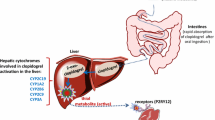Abstract
The presence of cytochrome P450 (CYP) variant alleles may reduce the activation of the prodrug clopidogrel to its active state. This research evaluated the frequency of variant alleles in the genes coding for CYP3A4, CYP3A5, CYP2C9, and CYP2C19 enzymes in patients on clopidogrel therapy and experiencing repeat acute coronary syndrome (ACS) compared to a control group with a matching ethnic composition. Real-time polymerase chain reaction was used for allelic discrimination. Complete data were obtained for 92 patients enrolled over a 3-month period. There were no significant differences in the presence of the examined CYP3A4, CYP3A5, CYP2C9, or CYP2C19 variant alleles between the two groups. The present data indicate that patients currently receiving clopidogrel therapy who present with repeat ACS do not have higher frequency of the examined variant alleles compared to a control group.
Similar content being viewed by others
References
Bilsel T, Akbulut T, Yesilcimen K, Terzi S, Sayar N, Dayi SU, Akgoz H, Ergelen M, Ciloglu F. (2006) Single high-dose bolus tirofiban with high-loading-dose clopidogrel in primary coronary angioplasty. Heart Vessels 21:102–107
Smith SC, Dove JT, Jacobs AK, Kennedy JW, Kereiakes D, Kern MJ, Kuntz RE, Popma JJ, Schaff HV, Williams DO (2001) ACC/AHA guidelines for percutaneous coronary intervention (revision of the 1993 PTCA guidelines)-executive summary. J Am Coll Cardiol 37:2215–2239
Murasaki S, Murasaki K, Tanoue K, Kawana M, Hagiwara N, Kasanuki H (2007) Circulating platelet and neutrophil activation correlates with the clinical course of unstable angina. Heart Vessels 6:376–382
Steinhubl SR, Berger PB, Mann III JT, Fry ETA, DeLago A, Wilmer C, Topol EJ (2002) Early and sustained dual oral antiplatelet therapy following percutaneous coronary intervention. JAMA 288:2411–2420
Nguyen TA, Diodati JG, Pharand C (2005) Resistance to clopidogrel: a review of the evidence. J Am Coll Cardiol 45:1157–1164
Serebruany VL, Steinhubl SR, Berger PB, Malinin AI, Bhatt DL, Topol EJ (2005) Variability in platelet responsiveness to clopidogrel among 544 individuals. J Am Coll Cardiol 45:246–251
Gurbel PA, Bliden KP, Hiatt BL, O’Connor CM (2003) Clopidogrel for coronary stenting: response variability, drug resistance, and the effect of pretreatment platelet reactivity. Circulation 107:2908–2913
Wang TH, Bhatt DL, Topol EJ (2006) Aspirin and clopidogrel resistance: an emerging clinical entity. Eur Heart J 27:647–654
Patrono C, Coller B, FitzGerald GA, Hirsh J, Roth G (2004) Platelet-active drugs: the relationships among dose, effectiveness, and side effects: the seventh ACCP conference on antithrombotic and thrombolytic therapy. Chest 126:234S–264S
Ozdemir V, Kalow W, Tang BK, Paterson AD, Walker SE, Endrenyi L, Kashuba AD (2000) Evaluation of the genetic component of variability in CYP3A4 activity: a repeated drug administration method. Pharmacogenetics 10:373–388
Lau WC, Gurbel PA, Watkins PB, Neer CJ, Hopp AS, Carville DGM, Guyer KE, Tait AR, Bates ER (2004) Contribution of hepatic cytochrome P450 3A4 metabolic activity to the phenomenon of clopidogrel resistance. Circulation 109:166–171
Suh JW, Koo BK, Zhang SY, Park KW, Cho JY, Jang IJ, Lee DS, Sohn DW, Lee MM, Kim HS (2006) Increased risk of atherothrombotic events associated with cytochrome P450 3A5 polymorphism in patients taking clopidogrel. CMAJ 174:1715–1722
Hulot JS, Bura A, Villard E, Azizi M, Remones V, Goyenvalle C, Aiach M, Lechat P, Gaussem P (2006) Cytochrome P450 2C19 loss-of-function polymorphism is a major determinant of clopidogrel responsiveness in healthy subjects. Blood 108:2244–2247
Fisher AA, Le Couteur DG (2001) Intracerebral hemorrhage following possible interaction between celecoxib and clopidogrel. Ann Pharmacother 35:1567–1569
Kidd R, Johnson M, Richard C, Adkins J, Harralson AF (2006) Frequency analysis and correlation of newer variant alleles of CYP2C9 and warfarin dose (abstract). J Clin Pharmacol 46:1085
Wojnowski L (2004) Genetics of the variable expression of CYP3A in humans. Ther Drug Monit 26:192–199
Hsieh FY, Bloch DA, Larsen MD (1998) A simple method for sample size calculation for linear and logistic regression. Statistics Med 17:1623–1633
Matetzky S, Shenkman B, Guetta V, Shechter M, Bienart R, Goldenberg I, Novikov I, Pres H, Savion N, Varon D, Hod H (2004) Clopidogrel resistance is associated with increased risk of recurrent atherothrombotic events in patients with acute myocardial infarction. Circulation 109:3171–3175
Snoep JD, Hovens MCM, Eikenboom JCJ, van der Bom JG, Jukema JW, Huisman MV (2007) Clopidogrel nonresponsiveness in patients undergoing percutaneous coronary intervention with stenting: a systematic review and meta-analysis. Am Heart J 154:221–231
Angiolillo DJ, Fernandez-Ortiz A, Bernardo E, Ramirez C, Cavallari U, Trabetti E, Sabate M, Hernandez R, Moreno R, Escaned J, Alfonso F, Banuelos C, Costa MA, Bass TA, Pignatti PF, Macaya C (2006) Contribution of gene sequence variations of the hepatic cytochrome P450 3A4 enzyme to variability in individual responsiveness to clopidogrel. Arterioscler Thromb Vasc Biol 26:1895–1900
Smith SMG, Judge HM, Peters G, Armstrong M, Fontana P, Gaussem P, Daly ME, Storey RF (2006) Common sequence variations in the P2Y12 and CYP3A5 genes do no explain the variability in the inhibitory effects of clopidogrel therapy. Platelets 17:250–258
Kim KA, Park PW, Park J-Y (2008) The effect of CYP2C19 polymorphism on the pharmacokinetics and pharmacodynamics of clopidogrel: a possible mechanism for clopidogrel resistance. Clin Pharmacol Ther 84:236–242
Author information
Authors and Affiliations
Corresponding author
Rights and permissions
About this article
Cite this article
Brackbill, M.L., Kidd, R.S., Abdoo, A.D. et al. Frequency of CYP3A4, CYP3A5, CYP2C9, and CYP2C19 variant alleles in patients receiving clopidogrel that experience repeat acute coronary syndrome. Heart Vessels 24, 73–78 (2009). https://doi.org/10.1007/s00380-008-1085-2
Received:
Accepted:
Published:
Issue Date:
DOI: https://doi.org/10.1007/s00380-008-1085-2




